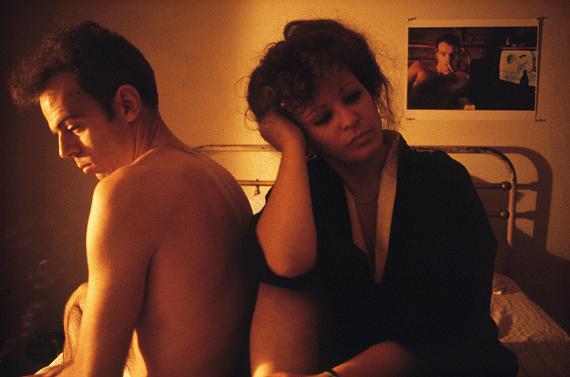
Brian and Nan in Kimono (Brian und Nan im Kimono), 1983
Photographie, aus der Serie "The Ballad of Sexual Dependency"
© Nan Goldin
Nan Goldin »
This Will Not End Well
Retrospektive
Exhibition: 23 Nov 2024 – 6 Apr 2025
Wed 12 Mar
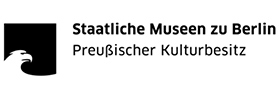
Neue Nationalgalerie
Potsdamer Str. 50
10785 Berlin
+49 (0)30-2662651
nng@smb.spk-berlin.de
www.smb.museum
Tue-Fri 10-18, Thu 10-22, Sat/Sun 11-18
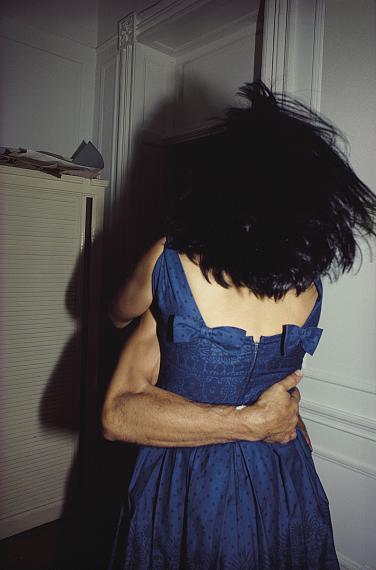
The Hug, New York City (Die Umarmung, New York City), 1980
aus der Serie "The Ballad of Sexual Dependency"
© Nan Goldin
Nan Goldin
"This Will Not End Well"
23 November 2024 – 6 April 2025
Opening: Friday, 22 November 2024 7pm
Neue Nationalgalerie’s retrospective is the first exhibition in Germany to present a comprehensive overview of Goldin’s work as a filmmaker. The exhibition is installed in six unique buildings designed by Hala Wardé, an architect who frequently works with Goldin. Each building is designed in response to the specific piece. Together they constitute a village. "I have always wanted to be a filmmaker. My slideshows are films made up of stills," says Nan Goldin.
The exhibition is comprised of: The Ballad of Sexual Dependency (1981–2022), her magnum opus; The Other Side (1992– 2021), a historical portrait produced as an homage to her trans friends whom she photographed 1972–2010; Sisters, Saints and Sibyls (2004–2022), a testament to the trauma of families and suicide; Fire Leap (2010–2022), a foray into the world of children; Memory Lost (2019–2021), a claustrophobic journey through drug withdrawal; and Sirens (2019–2020), a trip into drug ecstasy.
Nan Goldin (born in Washington D.C. in 1953) is one of the most high-profile artists of our time. Her work's exploration of the human experience is legendary and has profoundly influenced subsequent generations. Her first work, The Ballad of Sexual Dependency, documents life in Provincetown, the Lower East Side of New York City, Berlin and London beginning in the 1970s and 80s and up to the present day. Goldin photographed the world of her inner circle of creative, bohemian friends with raw tenderness. Her photographs give us snapshots of intimacy and coupling, the quotidian and wild parties, and the struggle between autonomy and dependency.
Of the generation whose experiences were defined by the freedom of life before AIDS and an alternative world outside normative society, Goldin’s work also stands as a document of the times. Around 1980 Goldin began presenting her slideshows in various clubs and public venues in New York, as well as at underground cinemas and film festivals in Europe. She updated and reedited her slideshow every time and used multiple projectors, which she operated against the background of an eclectic soundtrack. Goldin’s ability to revisit these slideshows has since formed the core of her artistic practice. Over the past 40 years Goldin has produced a dozen different slideshows – from portraits of her friends to accounts of traumatic family events. Since then, she has added elements into her works such as moving images, voices and archival materials.
Nan Goldin has always grappled with social issues such as gender, mental health and AIDS, albeit through various approaches. Memory Lost which also forms part of the current exhibition, is an evocation of the darkest sides of drug addiction. In 2017 Goldin founded P.A.I.N. (Prescription Addiction Intervention Now), a direct action group that specifically targeted the Sackler family. The group holds the billionaire family accountable for igniting the epidemic opioid overdose crisis. The Sacklers are a major donor to many prominent international museums. However, many of these institutions have reacted to pressure from P.A.I.N. and removed all trace of the Sackler name from their premises.
Alongside Goldin’s influence on art and the art world, it is also difficult to think of today’s fashion and advertising photography without reflecting on her ground- breaking paradigms of visual expression.
While the title of the exhibition This Will Not End Well may seem dark and foreboding, it is also full of ironic humour and warmth. The title is an affirmation of what Fredrik Liew, curator for the retrospective, describes as Goldin’s 'characteristically unshakeable joie de vivre.'
Nan Goldin has a very special relationship with Berlin: the Arsenal cinema showed her Ballad of Sexual Dependency back in 1982. In 1991, she received a DAAD scholarship, moved to the city and has been returning ever since: "The best years of my life were here in Berlin," Goldin said in 2010. "I don't say that lightly. I've been looking for a home all my life. The only place I feel myself and comfortable and feel real love for my friends is Berlin."
This Will Not End Well started as a comprehensive international exhibition tour at the Moderna Museet, Stockholm (29 October 2022–26 February 2023), travelled to the Stedelijk Museum in Amsterdam (31 August 2023–28 January 2024) and opens now at the Neue National-galerie in Berlin (23 November 2024–6 April 2025); It continues afterwards to the Pirelli HangarBicocca in Milan (9 October 2025–15 February 2026) and Réunion des musées nationaux – Grand Palais, Paris (March–June 2026).
A comprehensive catalogue is produced to accompany the exhibition, with 216 pages, 140 of which are illustrated, and texts by Vince Aletti, Thomas Beard, Guido Costa, Marvin Heiferman, Roni Horn, Patrick Radden Keefe, Caitlín R. Kiernan, Fredrik Liew, Andrea Lissoni, Gabor Maté, Cookie Mueller, Eileen Myles, Alfred Pacquement, Darryl Pinckney, Rene Ricard, Lucy Sante, Sarah Schulman, Anne Swärd, Hala Wardé and David Wojnarowicz. The catalogue is published in English and is distributed internationally by Steidl Verlag.
During the exhibition a limited edition of a book will also be published: a nine-volume series that reproduces all Goldin’s slide shows and multimedia projects including textual work with contributions from various authors, who offer their perspectives on the artist’s voluminous output. Both the catalogue and the book are published by Moderna Museet in collaboration with Steidl Verlag.
The exhibition is organized by Moderna Museet, in collaboration with Neue Nationalgalerie, Berlin, Stedejlik Museum, Amsterdam, Pirelli HangarBicocca, Milan and Réunion des musées nationaux – Grand Palais, Paris. Curated by Fredrik Liew, Chief Curator, Moderna Museet.
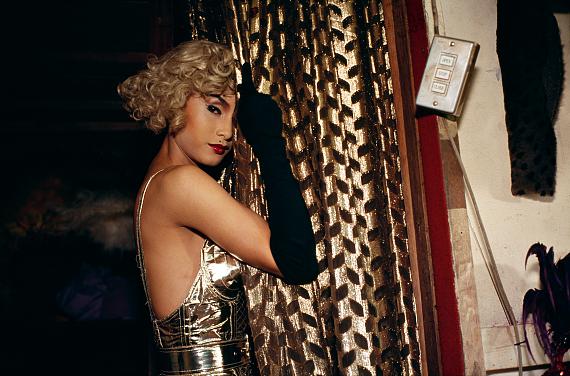
C as Madonna in the dressing room, Bangkok (C als Madonna im Umkleideraum, Bangkok), 1992
aus der Serie "The Other Side"
© Nan Goldin
Nan Goldin
"This Will Not End Well"
Ausstellung: 23. November 2024 bis 6. April 2025
Eröffnung: Freitag, 22. November 2024, 19 Uhr
Mit der Retrospektive in der Neuen Nationalgalerie wird erstmals ein umfassender Einblick in das Schaffen von Nan Goldin von 1980 bis heute gegeben. Ihre einzelnen Werkreihen werden in Form von Diashows und Filmen in von Hala Wardé entworfenen Pavillons in der oberen Halle der Neuen Nationalgalerie gezeigt – jedes dieser "Gebäude" ist in Bezug auf die jeweilige Werkreihe konzipiert; zusammen bilden sie eine Art Dorf. Nach dem Auftakt in Stockholm und Amsterdam wird die Ausstellung nun in Berlin gezeigt und reist im Anschluss nach Mailand und Paris.
Die Ausstellung umfasst folgende Arbeiten: Goldins Hauptwerk "The Ballad of Sexual Dependency" (1981-2022); "The Other Side" (1992-2021), ein historisches Porträt als Hommage an die Trans-Freund*innen der Künstlerin, die sie von 1972 bis 2010 fotografiert hat; "Sisters, Saints and Sibyls" (2004-2022), ein Zeugnis über das Trauma von Familien und Selbstmord; "Fire Leap" (2010-2022), ein Streifzug durch die Welt von Kindern; "Memory Lost" (2019-2021), eine klaustrophobische Reise durch den Drogenentzug; und "Sirens" (2019-2020), ein Trip in die Drogen-Ekstase.
Nan Goldin (geboren 1953 in Washington D.C.) ist eine der bekanntesten Künstler*innen unserer Zeit und wurde 2022 mit dem Käthe-Kollwitz Preis ausgezeichnet, erhielt im gleichen Jahr den Goldenen Löwen beim 79. Internationalen Filmfest von Venedig für ihre Dokumentation "All the Beauty and the Bloodshed" und 2007 den Hasselblad Award, Göteborg, Schweden. Die Auseinandersetzung mit der menschlichen Erfahrung prägt ihr Werk und hat nachfolgende Generationen tiefgreifend beeinflusst. Ihr erstes Werk "The Ballad of Sexual Dependency" dokumentiert das Leben in Provincetown, Massachusetts, der Lower East Side, New York City, Berlin und London von den 1970er- und 80er-Jahren bis in die Gegenwart. Goldin hat die Welt ihres engsten Freund*innenkreises fotografiert. Ihre Fotografien sind Momentaufnahmen von Intimität und Partnerschaft, von Alltag und wilden Partys, vom Kampf zwischen Autonomie und Abhängigkeit.
Goldins Werk ist auch ein Zeitdokument. Sie ist Teil einer Generation, deren Erfahrungen von der AIDS-Krise und einer Welt außerhalb der normativen Gesellschaft geprägt ist. Um 1980 begann Goldin, ihre Diashows in Clubs und an öffentlichen Orten in New York sowie in Underground-Kinos und auf Filmfestivals in Europa zu präsentieren. Sie aktualisierte und bearbeitete ihre Diashows jedes Mal neu und setzte mehrere Projektoren ein, die sie mit einem eklektischen Soundtrack unterlegte. Goldins Fähigkeit, diese Diashows immer wieder neu zu betrachten, bildet seitdem den Kern ihrer künstlerischen Praxis. In den letzten 40 Jahren hat Goldin ein Dutzend verschiedener Diashows produziert – von Porträts ihrer Freund*innen bis hin zu Berichten über traumatische Familienereignisse. Seitdem hat sie Elemente wie bewegte Bilder, Stimmen und Archiv-material in ihre Arbeiten aufgenommen.
Nan Goldin hat sich schon immer mit sozialen Themen wie Gender, psychischer Gesundheit und AIDS auseinandergesetzt, wenn auch mit unterschiedlichen Ansätzen. "Memory Lost", das auch Teil der aktuellen Ausstellung ist, ist eine Beschwörung der dunkelsten Seiten der Drogensucht. 2017 gründete Goldin P.A.I.N. (Prescription Addiction Intervention Now), eine Aktionsgruppe, die sich speziell gegen die Milliardärsfamilie Sackler richtet. Die Gruppe macht Sackler für die Auslösung der epidemischen Opioid-Überdosis-Krise verantwortlich. Die Sacklers sind wichtige Spender einiger bekannter internationaler Museen. Viele dieser Einrichtungen haben jedoch auf den Druck von P.A.I.N. reagiert und jede Spur des Namens Sackler aus ihren Räumlichkeiten entfernt.
Der Titel der Ausstellung "This Will Not End Well" erscheint düster und ahnungsvoll, aber er ist auch voller ironischem Humor und Wärme. Der Titel ist eine Bestätigung dessen, was Fredrik Liew, Kurator der Retrospektive aus dem Moderna Museet, Stockholm, als Goldins "charakteristisch unerschütterliche Lebensfreude" beschreibt.
Nan Goldin hat eine ganz besondere Beziehung zu Berlin: Bereits 1986 zeigte das Kino Arsenal ihre "Ballade der sexuellen Abhängigkeit" (1985). 1991 erhielt sie ein DAAD-Stipendium, zog in die Stadt und kehrt seither immer wieder zurück: "Die besten Jahre meines Lebens waren hier in Berlin", sagte Goldin 2010. "Ich sage das nicht leichtfertig. Ich habe mein ganzes Leben lang nach einem Zuhause gesucht. Der einzige Ort, an dem ich mich wie ich selbst und wohlfühle sowie echte Liebe für meine Freunde empfinde, ist Berlin."
Zur Ausstellung erscheint ein umfangreicher Katalog im Steidl Verlag: Englische Sprache, 216 Seiten, davon 140 illustriert, mit Texten von Vince Aletti, Thomas Beard, Guido Costa, Marvin Heiferman, Roni Horn, Patrick Radden Keefe, Caitlín R. Kiernan, Fredrik Liew, Andrea Lissoni, Gabor Maté, Cookie Mueller, Eileen Myles, Alfred Pacquement, Darryl Pinckney, Rene Ricard, Lucy Sante, Sarah Schulman, Anne Swärd, Hala Wardé und David Wojnarowicz, ISBN 978-3-96999-058-2, 48 €.
Während der Ausstellung erscheint ein Buch in limitierter Auflage: eine neunbändige Reihe, die alle Diashows und Multimediaprojekte von Goldin wiedergibt, einschließlich Textarbeiten mit Beiträgen verschiedener Autor*innen, die ihre Sicht auf das umfangreiche Werk der Künstlerin darlegen. Sowohl der Katalog als auch das Buch werden vom Moderna Museet in Zusammenarbeit mit dem Steidl Verlag herausgegeben.
Das Gesamtprojekt wird kuratiert von Fredrik Liew, Chief Curator, Moderna Museet. Die Präsentation in der Neuen Nationalgalerie wird kuratiert von Klaus Biesenbach, Direktor Neue Nationalgalerie und Lisa Botti, Kuratorin Neue Nationalgalerie.
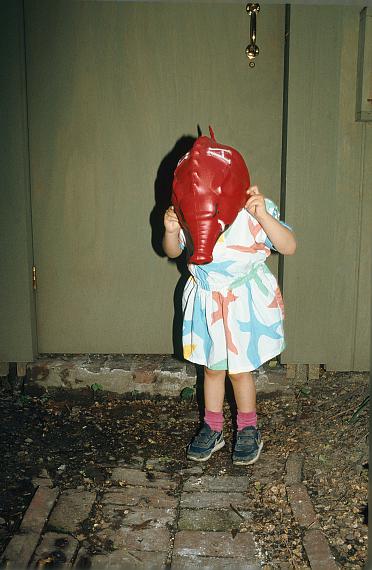
Elephant mask, Boston (Elephantenmaske, Boston), 1985
aus der Serie "Fire Leap"
© Nan Goldin
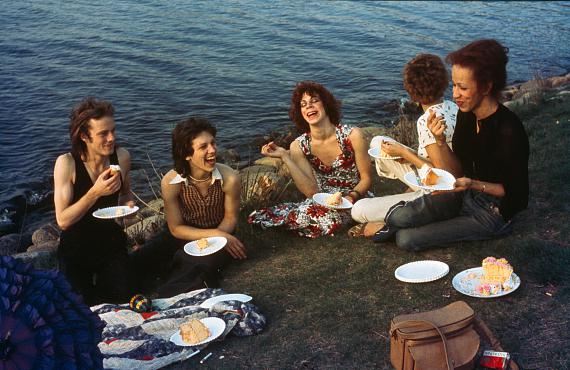
Picnic on the Esplanade, Boston (Picknick auf der Esplanade, Boston), 1973
aus der Serie "The Other Side"
© Nan Goldin
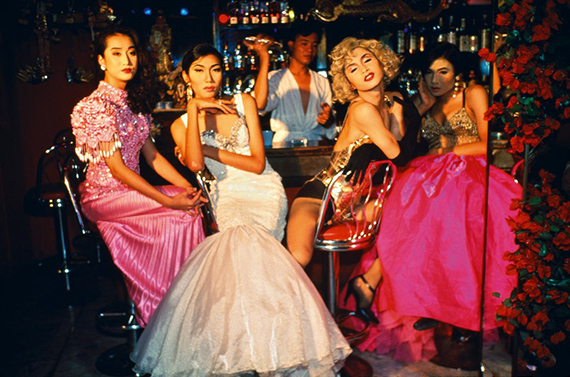
Fashion show at Second Tip, Toon, C, So and Yogo, Bangkok (Modenschau im Second Tip, Toon, C, So and Yogo, Bangkok), 1992,
Photographie, aus der Serie “The Other Side”
© Nan Goldin. Courtesy the artist
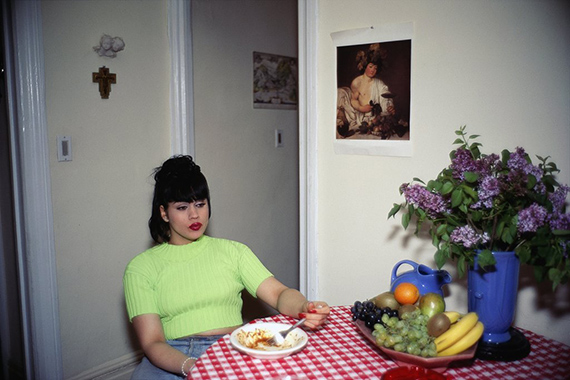
Gina at Bruce’s dinner party, NYC (Gina bei Bruce’s Dinner Party, NYC), 1991,
Photographie, aus der Serie “The Other Side”
© Nan Goldin. Courtesy the artist